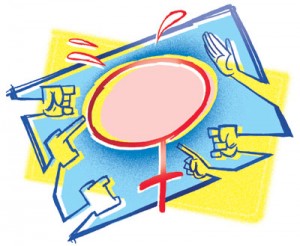It can be said for countries all over the world, that each one has its particular moral standing on this globe. While America is the land of free thinkers, France signifies liberation of inhibitions and Afghanistan, well, for everything oppressed. India, since forever, has been the country which has prided itself for being the custodian of its supposed moral traditions.
The global understanding of India is that of a motherland that respects femininity to the point of worship; one that upholds its cultures and the system of family and society supersedes personal needs. But somewhere down the line, this image is slowly diminishing to make way for a greater preceding truth, that of being stuck up in its times. They say that time is a constant change. And with time, the society is forever going through a constant spiral of changes. While India was a country of inhibitions and closed door hypocrisy, recent times have seen a spring in individuals wanting to be rid of the shackles of societal norms.
And what are the societal norms? In a country like India, where local impression has a higher standing, individual lifestyles and preferences have forever been the subject of judgement and scrutiny. And if, God forbid, someone were to resort to an unconventional style, they are labeled rebels and branded unfit. While every Indian must respect his origins and what prompted the country’s morals, the country too must respect someone who chooses not to abide by the cliché. Moral policing is an offshoot of exactly that that is one of the major issues of Indian society, standoffishness.
A society is formed thus because of acceptance and that alone; where people with different choices come together to exist in harmony. As adults, one should be allowed to choose the kind of lifestyle they want to live. It must be understood that it is important to respect social introvertedness as well as that quality to be out there unabashed. Indian society has never been void of youngsters wanting to have a good time, but throughout its history, such youngsters have been termed immoral. Even if they were to be judged, is it not important to let them be, and respect their privacy.
In the recent past, we have noticed certain political outfits reacting violently to the urban lifestyle of clubbing. These hooligans, hiding behind the carefully structured mask of guardians of India’s perceived morality have often been disrupting parties and lashing out at youngsters, propelling violence. The most recent incident involving a naive Mangalorean political party, Hindu Jagrana Vedike, making way to a private party at a resort, reveals some shocking situations. Images released, on purpose of course, show these supposed custodians reacting more violently to women than to men. This may also bring to mind the RSS clubbing incident that happened in Mangalore a couple of years back when women were beaten up in clubs. It also brings to light the need to cause violence as such to come into the national political limelight.
It is high time we realise that one must not set morals and fixed behavioural patterns for the society. And even if these are set, they cannot be imposed on others. Most importantly, one must stop measuring a society by the supposed waywardness of the women involved. India needs to release itself from the shackles of cultural oppression and move on to an independence of greater good – where an individual is respected and that alone. With the recent, and hopefully over, Vasant Dhoble tirades, it must also be realised that India must do away with age old laws that are not in tandem with today’s times. Politicians must aim their work towards the betterment of the state and working for the oppressed, not enjoying oppressing others.
For a country which prides itself on respect, it is high time this respect it meted out to each other.
Disclaimer: The views expressed in the article are of the author alone and not necessarily endorsed by the publisher, its partners, or its parent organisation.












